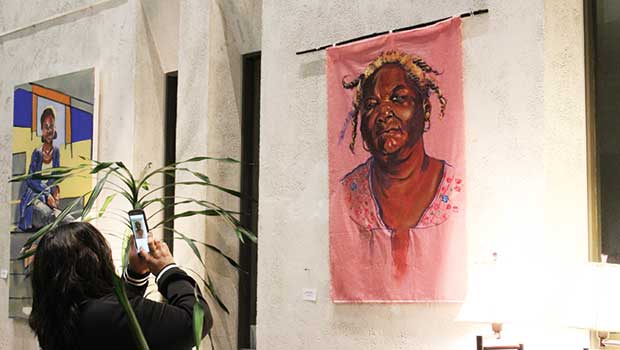
Through April 6, the Sherrill Library at Lesley University in Cambridge exhibits “Portraits & Power,” featuring local artists and Lesley students Mosheh Tucker and Rocky Cotard. In time for Women’s History Month, Tucker and Cotard’s works celebrate the women of color in their communities.

Author: Courtesy Mosheh TuckerA painting by Mosheh Tucker.
On the web
For more information about the exhibition and artists, visit: https://lesley.edu/events/portraits-power
Tucker is a Boston native and has lived in Dorchester, Hyde Park and Mattapan. “Much of my perception of representation comes from what I’ve seen and heard here in Boston,” he says. His three large-scale portraits in the show depict female friends and family members in different styles. Tucker says he’s in an experimental period where he’s discovering different manipulations of paint and canvas to render his subjects.
Despite his exploration of technique, Tucker feels the subject is paramount. He interviews his sitters at length before painting them, believing that the more he knows, the better he can capture them.
Cotard’s portraits also spring from a personal place. Born and raised in Haiti, Cotard recently discovered he’s related to a female political leader who worked closely with a dictatorship. His “Portraits & Power” pieces feature his sister and grandmother, and he uses the process of painting female figures he knows and loves to reconcile with this personal discovery.
“The point of all the portraits is to show the power women have,” says Cotard. “I want the viewer to think, ‘How do I interact with this portrait?’ and ‘How do I interact with people of color?’”
Cotard paints on fabric, because he believes it connects him to the artist who made the fabric, adding another layer onto the work’s artistic history. The portrait of his grandmother is painted on cloth he brought back from Haiti, the same fabric that his childhood school uniform was made of.
For both artists, engagement with the viewer is essential. Their subjects stare out from the canvas, locking eyes with spectators, demanding they be seen. “My need to make such large portraits and render the form in such a dominant way comes from the lack of representation of the black experience,” says Tucker. “You’re in the subject’s space, not the other way around.”
Cotard’s figures, too, refuse to back down in deference to the viewer. They are strong, they are present and they will be acknowledged.
On Friday, April 6, both artists will be present at the exhibition’s closing reception at Sherrill Library in Cambridge beginning at 6 p.m.







